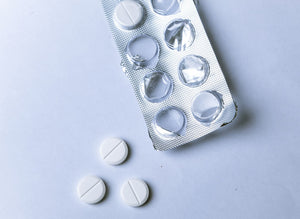PPI’s, NSAIDs and Probiotics
April 07, 2015

It’s not just antibiotics that disrupt the harmony of your intestinal tract, two classes of commonly prescribed drugs: non-steroidal anti-inflammatory drugs (NSAIDs) and proton pump inhibitors (PPIs) do too. Chances are you’ve taken a NSAID to reduce pain or ease inflammation in the past. These medications are even sold over-the-counter for relief of muscle aches, headaches and for temporary relief of minor sources of pain. PPIs are prescribed for relief of acid reflux and overproduction of stomach acid and to lessen the digestive side effects of NSAID.
Once thought to be relatively benign, recent research shows NSAIDs are linked with a number of side effects. Even at the doses doctors recommend they can damage the mucosal lining of the stomach and lead to bleeding. Less well recognized is the fact that NSAIDs can also harm the lining of the small intestines and lead to ulceration. In fact, a study showed between 50% and 70% of people who take NSAIDs long-term experience injury to their small intestinal tract.
To counter the harmful effects of NSAIDs on the stomach, doctors often prescribe PPIs. This class of medications works by blocking production of stomach acid. This solves one problem: It reduces the risk of stomach bleeding associated with taking a NSAID, but does nothing to mitigate the harmful effects they have on the small intestinal tract. In fact, giving PPIs can make the problem worse by altering the gut bacteria that may offer some protection against damage to the small intestinal tract.
Probiotics and NSAID: What Does Research Show?
A study published in the Journal of Gastroenterology in 2011 showed taking PPIs worsens damage to the small intestines caused by NSAIDs partially by altering gut bacteria in the small intestinal tract. This study proposes that damage might be prevented or even reversed by restoring healthy gut bacteria. Another study showed that the growth of bacteria that cause damage and ulcer formation in the small intestinal tract in response to NSAID could be blocked by certain strains of probiotics bacteria (Bifidobacterium and Lactobacillus). They concluded, “Probiotics could prove efficacious to protect the intestinal mucosa in patients continuing NSAID and PPI therapy.”
Despite the damage NSAIDs cause, millions of people take them on a daily basis to relieve inflammation associated with conditions like arthritis. PPI therapy has its own unique set of hazards: taking PPIs can reduce absorption of dietary calcium and magnesium and increase the risk of infection, including pneumonia. Plus, using PPIs long-term can reduce bone density and places users at a higher risk for osteoporosis. Unfortunately, discontinuing PPIs is challenging because some people experience an increase in stomach acid production and worsening of heartburn symptoms when they stop taking them
As you can see, taking NSAIDs and/or PPIs can be hazardous to your health. One potential way to protect against the harmful effects of these commonly used medications on the small intestines is to reinforce the intestines with gut-friendly, probiotic bacteria. There’s more than one reason to do so. Probiotic supplements may offer other health benefits as well by supporting healthy digestive and immune function. It’s a small step that can potentially pay off in the form of better health.
The post PPI’s, NSAIDs and Probiotics appeared first on Natren Probiotics Blog.





Leave a comment